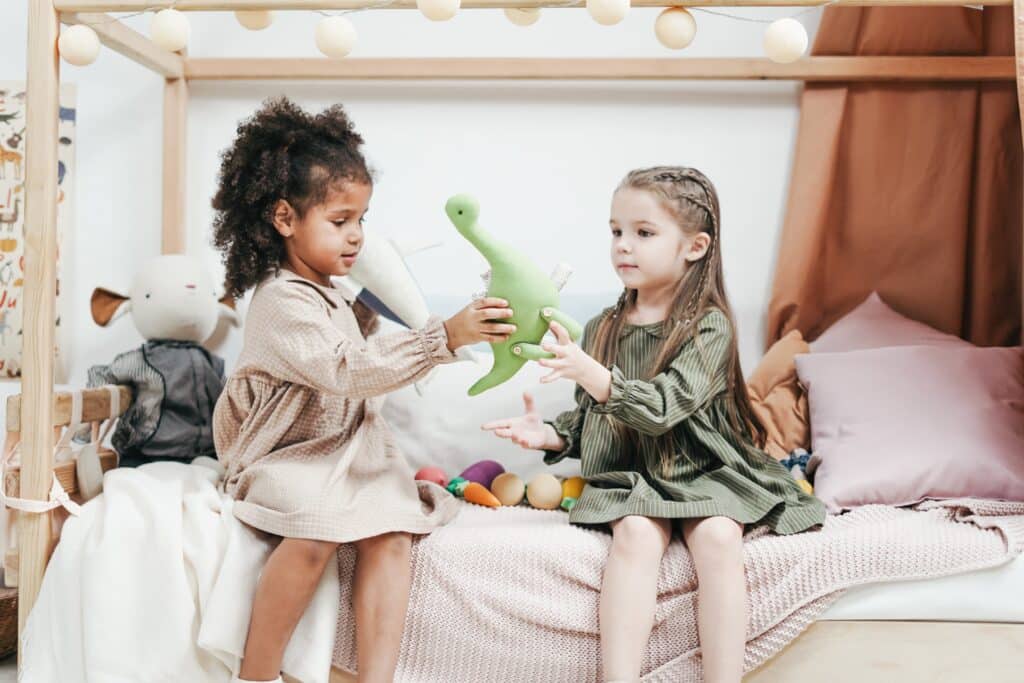Activities
Sharing is Caring – Activities

Helping Your Toddler Learn to Share
Toddlers are just beginning to learn about ownership and belongings, so sharing is a difficult skill to master. In their mind, your toddler is the center of the world (or at least your world!) so working with others and sharing toys is a big concept for them to understand. They may grab things, push other kids away, or refuse to share a toy. Whether the ensuing fight is with siblings or with friends, it can create tense situations that can feel difficult to work through. With a little time and effort, your toddler can begin to learn to share with others around them!
How to Help Your Child Share
Taking turns is often an easier concept to grasp than sharing. Taking turns means I play with the toy, then my friend plays with the toy, then I play with the toy again. Knowing the toy is not gone forever sometimes makes it an easier sell when learning this concept.
Set a good example for your child. Model how you share by offering them a piece of a snack that you’re eating or letting them have a turn with something you’re doing.
Choose activities that encourage your child to take turns. An activity like rolling or kicking a ball to one another or building with blocks will naturally lead your child to share. While watching them play, give your toddler plenty of praise so they understand that sharing is important! Help them feel proud of themselves for sharing. More than anything, they want to be grown up and do grown-up things — like sharing.
Talk about why sharing is good for your child and others. One way we show our friends we like them is to share our toys. You can say something like, ‘When you share your things with your friend, everyone gets to have fun’.
Praise your child throughout the day as well! When you notice your toddler waiting their turn or letting others play with their things, tell them that you noticed and that they’re being a good friend by taking turns! While things are calm, talk to your child about why sharing is something that you value so that they can start to understand the reasoning behind the behavior.
How to Respond to Sharing Issues
Be clear when talking to your child about what you would like them to do. If they’re grabbing a toy out of another child’s hand, clearly and calmly tell them that their friend wasn’t done using that toy and that they can have a turn when their friend is finished. If your child has trouble waiting for their next turn or giving up their turn, consider setting a timer.
If they are having trouble giving up their turn it might be helpful to ask your toddler/preschooler how they’d feel if someone took their toy, pushed them away, or didn’t let them have a turn.
Talking to your child about other people’s feelings will help your child understand things from someone else’s point of view which is the beginning of empathy.
You can also point out how nice it feels when we see our friend enjoying a toy we love. You are planting seeds for cooperative play, which develops as kids learn to trust each other, in part by taking turns.
Be realistic about a 2-4-year-old’s ability to share. At this age, most children are still learning and can find it hard to understand other people’s thoughts and emotions. Continue the conversation, and they will naturally learn through your guidance as their own emotional intelligence grows, in part, through positive sharing experiences.
-

 Destination8 months ago
Destination8 months agoSingapore Airlines CEO set to join board of Air India, BA News, BA
-

 Breaking News10 months ago
Breaking News10 months agoCroatia to reintroduce compulsory military draft as regional tensions soar
-

 Gadgets3 months ago
Gadgets3 months agoSupernatural Season 16 Revival News, Cast, Plot and Release Date
-

 Tech News12 months ago
Tech News12 months agoBangladeshi police agents accused of selling citizens’ personal information on Telegram
-

 Productivity11 months ago
Productivity11 months agoHow Your Contact Center Can Become A Customer Engagement Center
-

 Gadgets3 weeks ago
Gadgets3 weeks agoFallout Season 2 Potential Release Date, Cast, Plot and News
-

 Breaking News10 months ago
Breaking News10 months agoBangladesh crisis: Refaat Ahmed sworn in as Bangladesh’s new chief justice
-

 Toys12 months ago
Toys12 months ago15 of the Best Trike & Tricycles Mums Recommend























